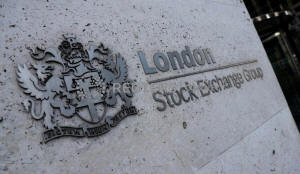World stocks succumb to virus as cases spread, disruptions grow
 Send a link to a friend
Send a link to a friend
 [March 06, 2020]
By Ritvik Carvalho [March 06, 2020]
By Ritvik Carvalho
LONDON (Reuters) - Global stock markets
tumbled on Friday as disruptions to business from the spreading
coronavirus epidemic worsened, stoking fears of a prolonged economic
slowdown.
European shares opened sharply lower, with travel stocks bearing the
brunt. The pan-European STOXX 600 index was down 2.4% by 0856 GMT. [.EU]
Germany's DAX <.GDAXI> slid 2.4%, Britain's FTSE 100 <.FTSE> fell 1.8%
and France's CAC 40 <.FCHI> fell 2.4%.
The MSCI All-Country World Index <.MIWD00000PUS>, which tracks shares
across 47 countries, was down 0.72%.
After marking their worst weekly performance since the 2008 financial
crisis, global stocks as measured by the index are up 1.7% this week, as
sentiment recovered on the back of stimulus from policymakers to combat
the economic fallout of the virus.
The U.S. Federal Reserve made an emergency interest rate cut of 50 basis
points earlier this week. The Bank of Canada and the Reserve Bank of
Australia also cut rates, with investors expecting other major central
banks to soon follow suit.
Officials and companies in Britain, France, Italy and the United States
are struggling to deal with a steady rise in virus infections that have
in some cases triggered corporate defaults, office evacuations, and
panic buying of daily necessities.

The outbreak spread across the United States on Thursday, surfacing in
at least four new states.
"The interplay of virus containment fears and stimulus measures means
that in the near term we expect market volatility to persist," said Mark
Haefele, chief investment officer at UBS Global Wealth Management.
Yields on U.S. Treasuries fell to a record low and Treasury futures
jumped as investors increased bets that the Fed will follow this week's
surprise rate cut with further easing.
The yield on benchmark 10-year Treasury notes <US10YT=RR> fell to a
record low of 0.7650% on Friday.
Minneapolis Federal Reserve President Neel Kashkari said late on
Thursday the Fed could cut rates further if needed.
Money markets are pricing in another 25 basis-point-cut from the current
1% to 1.25% range at the next Fed meeting on March 18-19 and a
50-basis-point cut by April.
Rapidly falling yields hammered the dollar, which fell to a six-month
low versus the yen and close to a two-year trough against the Swiss
franc. [FRX/]
Germany's benchmark 10-year Bund yield fell to a six-month low within
striking distance of last year's record lows. [GVD/EUR]
The flu-like virus emerged late last year in the central Chinese city of
Wuhan and has since spread to more than 80 countries. It has claimed
more than 3,000 lives, and though new infections have slowed in China
there are concerns other countries are not prepared.
[to top of second column]
|

Signage is seen outside the entrance of the London Stock Exchange in
London, Britain. Aug 23, 2018. REUTERS/Peter Nicholls/File Photo

Travel restrictions and factory closings aimed at curbing the spread
of the virus are expected to pressure global growth.
Many investors were awaiting the release of U.S. non-farm payrolls
later on Friday. Recent U.S. economic data has been encouraging, but
concerns about the epidemic are likely to overshadow any signs of a
strong labour market.
Earlier in Asia, MSCI's broadest index of Asia-Pacific shares
outside Japan <.MIAPJ0000PUS> fell 2.1%, while Japan's Nikkei stock
index <.N225> sank 2.94%. Australian shares <.AXJO> were down 2.44%.
Shares in China <CSI300.> fell 1.22%, while stocks in Hong Kong
<.HIS>, another city hard hit by the virus, fell 2.12%.
Against the Japanese yen <JPY=>, the dollar fell to a six-month low
and was last at 105.77 yen. The greenback also sank to a two-year
trough of 0.9410 Swiss franc <CHF=EBS>.
Sterling <GBP=D3> traded near a one-week high versus the dollar.
The euro <EUR=EBS> gained 0.3% to trade $1.1271. Markets in the euro
zone are pricing in a 93% chance that the European Central Bank will
cut its deposit rate, now minus 0.50%, by 10 basis points next week.
The single currency has now reversed all its earlier losses for the
year, rising from below $1.08 a few weeks ago to above $1.12.
ING analysts said they were targeting $1.15 in the coming weeks as
aggressive U.S. rate cuts contrasted with the limited room for
action at the European Central Bank.
"For now, expect USD weakness vs G10 FX to continue, and the G10 FX
segment outperforming EM FX, with carry trades under pressure," they
said in a research note.
Oil prices also fell due to worries that non-OPEC oil producers
might not agree to output cuts even though global energy demand is
weakening.
U.S. crude <CLc1> fell 1.63% to $45.15 a barrel, while Brent <LCOc1>
fell 1.8% to $49.10, with worries about a decline in global demand
due to the virus outbreak and uncertainty about production cuts
hurting prices. [O/R]

(Reporting by Ritvik Carvalho; additional reporting by Tommy Wilkes
in London and Stanley White in Tokyo)
[© 2020 Thomson Reuters. All rights
reserved.] Copyright 2020 Reuters. All rights reserved. This material may not be published,
broadcast, rewritten or redistributed.
Thompson Reuters is solely responsible for this content. |